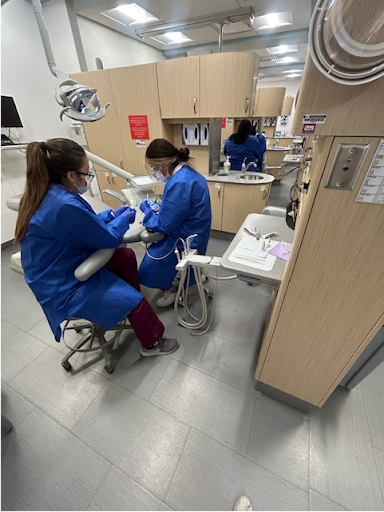Colorado Oral Health News Spring 2025: Basic Screening Survey Report Release, OHU Staffing Announcements, and More!

Letter from the Dental Director
Dear Friends,
The Oral Health Unit (OHU) is happy to announce the release of the latest Basic Screening Survey Report. The 2022-23 Basic Screening Survey report details the burden of oral disease in Colorado’s kindergartners and third graders. The survey, an oral exam conducted by a dental professional at schools, is conducted at two key developmental stages and provides vital insights into the overall prevalence of cavities among young Coloradans.
Importantly, the findings reveal a high level of tooth decay in Colorado’s children and disparities in oral health that especially impact some families. Access to dental care remains one factor in these findings, as many families face barriers such as cost, transportation, and provider availability. These challenges contribute to untreated decay and disparities in oral health outcomes.
Key findings include:
- Rural third graders had lower rates of untreated decay (17.0%) than urban students (26.4%), reflecting the impact of school-based programs aimed at preventing cavities. This is the inverse of what is observed in other parts of the country where children experience higher rates of decay and lower use of preventive care in rural communities.
- Over 60% of third graders and nearly 46% of kindergarteners had experienced a cavity, with about one-quarter needing urgent dental care at the time of screening.
- Children in lower-income schools had significantly higher rates of cavities, revealing strong evidence of socioeconomic disparities in oral health.
- Black and Hispanic kindergarteners experienced nearly double the rate of cavities compared to white peers, with similar disparities among third-graders.
The latest Basic Screening Survey findings emphasize the urgency to address childhood oral disease. Research has shown the links between oral health and overall health. By identifying these needs early, we can collaborate with schools, health care providers, and community partners to promote evidence-based prevention strategies that have the capacity to improve the health of Colorado children throughout their lives.
One highlight of the report is that schools with a relationship to OHU-funded Regional Oral Health Specialists and/or Federally Qualified Health Centers with a school-based oral health program tended to have better student oral health measures related to disease burden and protective interventions. This suggests that these partners for prevention help resist the decline in rural oral health status that is observed in other parts of the country.
The full report and the Colorado Basic Screening Survey Dashboard are available on the Colorado Oral Health website.
In bittersweet news, I am announcing my departure from the Colorado Department of Public Health and Environment (CDPHE). It has been a privilege to work with the OHU, CDPHE leadership and staff, and all of our partners across the state. I know that the OHU and partner network will continue their great work in improving the lives and smiles of all Coloradans, even in the face of new challenges. The work that you are implementing is more imperative than ever to the health and wellbeing of Colorado communities.
The OHU will continue its great work with partners in prevention, workforce, community water fluoridation, and other initiatives. Jenni Lansing and Ashleigh Kirk will take over as points of contact in my stead after May 15th of this year.
Thank you for all that you do in service of the great state of Colorado.
Sincerely,

Maryam Mahmood DMD, MPH
State Dental Director
News & Hot Topics
National Head and Neck Cancer Awareness Month
April is Head and Neck Cancer Awareness Month. Head and neck cancers can originate in several places in the head and throat, including many locations examined by oral health professionals during oral cancer screening such as the tongue, gingiva, roof of mouth, back of throat, lips, and glands within the neck and oral cavity, to name a few. According to the CDC, risk factors like alcohol and tobacco use, overexposure to ultraviolet (UV) rays, occupational exposure, radiation treatments to the head and neck, and HPV infection can increase the risk of developing head and neck cancer.
CDPHE Community Water Fluoridation statement available in Spanish
The CDPHE Statement on Community Water Fluoridation (CWF) is now available in Spanish. Visit the CDPHE CWF webpage to access English and Spanish versions of the developed statement and contact cdphe.psfluoridationsmf@state.co.us with any water fluoridation-related questions.
Behavioral and Oral Health Integration Project
Oral health and behavioral health have many bidirectional effects on overall well-being. Data indicates that individuals with mental health and substance use disorders tend to have worse oral health than the general population. For example, people with severe mental illness have 2.7 times the likelihood of losing all teeth.
In recognition of the significant connection between oral health and behavioral health, the OHU developed trainings and tools for behavioral health and oral health interprofessional collaborations. Visit the OHU website to learn more.
Statewide Antibiogram for Bacteria in Hospitals Updated
CDPHE updated the statewide antibiogram to include gram-positive and gram-negative pathogens. This antibiogram reports the percent susceptibility (%S) of antibiotics to bacteria submitted by Colorado hospitals (n=34 hospitals) to the National Healthcare Safety Network (NHSN) Antimicrobial Resistance option in 2023. The Colorado antibiogram is a tool for antibiotic stewardship and is not intended for clinical use. It should be used in the context of other factors important to improving antibiotic use. Health care providers should choose antibiotics based on activity, proven effectiveness, potential for antibiotic resistance or adverse events, and clinical judgment. If you have any questions, please contact cdphe_hai_ar@state.co.us.
Stories from the field
Practice-Based Health Education Grant Program Grantee Spotlight – Clinica Family Health

As part of a statewide effort to tackle the shortage of health care workers, the Practice-based Health Education (PBHE) Grant Program is making strides in expanding hands-on clinical training across various health care fields. A major focus is on oral health, with programs like the Clinica Family Health Dental Assistant (DA) Training Program leading the way.
This innovative program provides an incredible opportunity for entry-level staff and community members to kickstart their careers in dental health care — completely free of charge. Thanks to the PBHE grant, the program covers all tuition costs, eliminating a barrier that often prevents people from pursuing education and training in this field.
Throughout the 12-week program, students receive thorough instruction in clinical safety, infection control, managing patient information, general assessments, chairside assisting, and radiology. The experience wraps up with a heartwarming graduation ceremony, where students get to celebrate their achievements with friends and family.
What really makes Clinica’s program stand out is its dedication to long-term success. Staff members work closely with students to help secure job placements within the organization even before they graduate. In less than a year, the program has successfully trained and hired 10 dental assistants, and that number continues to grow each quarter.
By breaking down financial barriers and offering real job opportunities, Clinica’s DA Training Program is not just changing individual lives — it’s also bolstering the future of Colorado’s health care system.
For more information on the Clinica DA Training Program please visit their website.
Partner Links
Aqua Talk Article on Fluoride in Drinking Water
The Colorado Department of Public Health and Environment Water Quality Control Division provides a safe drinking water information hub to communicate drinking water issues and news to water plant owners, operators, water providers, and other safe drinking water stakeholders. A recently developed blog provides information on the safety and benefits of optimally fluoridated drinking water.
Read the Aqua Talk blog on Community Water Fluoridation. To receive Aqua Talk blog posts in your email inbox, subscribe to the Safe Drinking Water program email list.
Calling All Health Care Professionals: Become a Mentor in the Colorado Health Service Corps (CHSC) Futures Program!
The CHSC Futures Program is looking for dedicated CHSC, National Health Service Corps, and state Dental Loan Repayment Program alumni to serve as mentors who are passionate about guiding the next generation of health care professionals. As a mentor, you’ll have the opportunity to support students at various stages of their health care journey, offering valuable career insights, advice, and first-hand experience with the CHSC program. Check out the Mentor Overview and sign up to be a mentor today and help build a more inclusive health care workforce!
Please contact Alyssa Collado with any questions or to request additional information.

Prenatal, Infant, Toddler
Measles (Rubeola): Early detection and warning signs in oral health
According to the CDC, measles can be dangerous, especially for babies and young children. Measles is highly contagious and often severe, but it is a preventable disease. Early signs of measles, like Koplik spots (tiny white spots), may appear inside the mouth before the onset of other symptoms, such as a skin rash. Oral health professionals may detect signs of measles during dental appointments and can also provide patient education on early detection and warning signs for parents and caregivers, and recommendations for vaccines to protect children from measles. Visit the CDC Measles Symptoms and Complications website to learn more.
The measles, mumps, and rubella (MMR) vaccine is safe and highly effective, providing long-lasting protection. Vaccination is the best way to protect yourself, your family, and your community from MMR. Visit the CDPHE Champions for Vaccine Equity website to view MMR vaccine public service announcement videos and to share with your networks.
CDPHE is closely monitoring the ongoing outbreaks. Read the measles health alert network message from March 11, 2025.
Resource Fair: CO4Kids Resource Fair
The Colorado Department of Human Services’ Office of Children, Youth and Families, Colorado Department of Early Childhood, and CDPHE have partnered together to host the 2025 CO4Kids Resource Fair at the Denver Zoo on April 27th from 10:00am to 2:30pm. To learn more about the event, please visit the sign up sheet.

School-Age
Article: Links Between Sugar and Dental Decay in US Children from Low-Income Families
CareQuest Institute for Oral Health recently published a research report reviewing the association between the consumption of sugar and dental decay incidence in children and adolescents from low socioeconomic families. The systematic review found that there is a positive association between sugar intake and dental caries prevalence in children from low-income families. To read the full report, visit the CareQuest website.

Older Adult
World Elder Abuse Awareness Day 2025
The United Nations (UN) has designated June 15 as World Elder Abuse Awareness Day (WEAAD). WEAAD brings together older adults, their caregivers, government agencies, non-profits, and advocacy groups to combat the problem of elder abuse.

Elder Abuse Awareness Day events focus global attention on the physical, emotional, sexual, and financial abuse of older adults. It seeks to understand the difficulties and opportunities presented by an aging population. It provides the opportunity to exchange ideas for reducing violence toward older adults, how to increase reporting of abuse of older adults, how to reduce ageism, and how to reduce the stigma of older adult abuse.
Estimates indicate that by 2025, the global population of people over the age of 60 will exceed the number of younger people. Data suggests that 4 to 6% of older adults endure some type of abuse; a large portion of older adult abuse is not reported.
The first WEAAD was observed in 2012 and was marked by conferences and discussions at the UN headquarters in New York. The purpose of WEAAD is to encourage communities to recognize the problem of older adult abuse and for countries to create policies that foster respect and value for older adults. Older adults have great wisdom and understanding to share with their communities. Visit the Colorado Department of Human Services Adult Protective Services website to learn more about older adult protective services and to locate information on how to report older adult abuse to Adult Protective Services and Law Enforcement.
Contact Us
- Sign up for this newsletter.
- Check out our YouTube channel.
- Contact Us by emailing us at cdphe_oral_health_unit@state.co.us.


